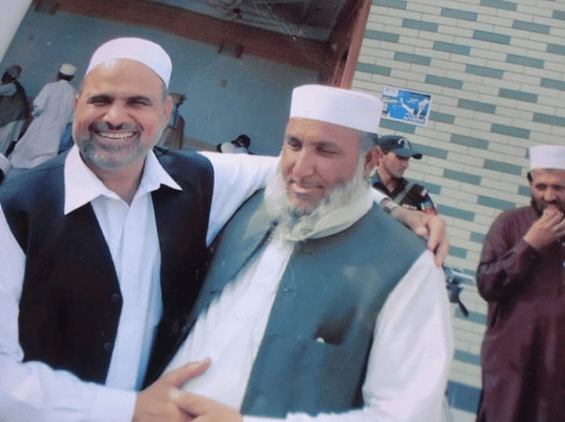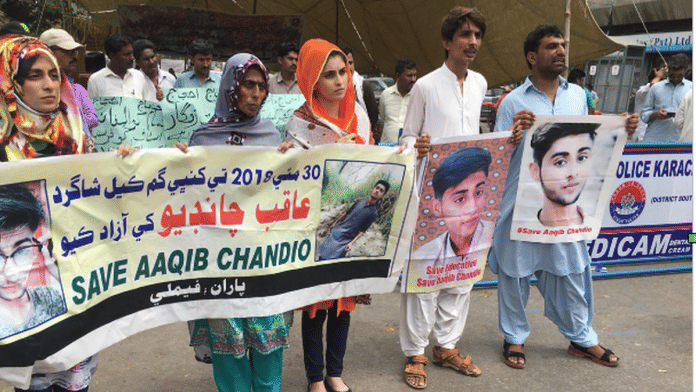Pakistan: The June heat was menacing but Shazia Chandio and her mother sat outside the Karachi Press Club for hours. They came from Larkana, travelling a distance of over 400 km, in search of answers about Aqib Chandio — Shazia’s 18-year-old brother who went missing after he was allegedly abducted by uniformed men on 30 May last year. Aqib’s family is still clueless on his whereabouts even as the government refuses to give an answer.
Aqib isn’t alone. He is one among 41 Sindhi activists, over 135 Muttahida Qaumi Movement (MQM) members, 8,000 Pashtuns and over 20,000 from the Baloch community who have mysteriously disappeared in recent years. Not to forget the Pakistani Shias who have gone missing.
“We have no idea where he is being kept and under what circumstances. How can they take away a teenager like this? We have met former chief justice of Pakistan Saqib Nisar three times but to little avail. He only sympathised with us,” said Shazia, who is part of a group called Voice of Missing Persons-Sindh (VMP-S) that has been protesting against the disappearance of Sindhis.
“Aqib is a very sensitive boy. He was moved by the plight of families of missing persons and would take part in protests,” said Sorath Lohar, 26, also a member of VMP-S.
Sorath’s father, Hidayat Lohar, too had gone “missing” — for nearly 26 months — but was recovered in June this year. VMP-S has a list of missing persons that include names of at least 41 activists.
‘Voluntary disappearances’
Pakistan’s history of ‘enforced disappearances’ originated during the tenure of military ruler General Pervez Musharraf. Nearly 4,000 Pakistanis who were reported to have gone missing from 2002 to 2008 were allegedly handed over to foreign countries, especially the US.
The country has refused to sign the United Nations’ International Convention for the Protection of All Persons from Enforced Disappearance despite several promises made by the government over the years.
The impunity with which the government has reportedly been carrying out these forced disappearances can be gauged by a reply that it gave to the International Covenant on Civil and Political Rights (ICCPR) in the United Nations’ Human Rights Commission office, Geneva, on 12 July, 2017.
When asked about enforced disappearances, the state representatives had then said those reported missing have “disappeared voluntarily“.
On 5 July, Pakistan Army spokesperson Asif Ghafoor tweeted saying: “Not every person missing is attributable to state”. He, however, failed to inform under what law can a citizen be kept in custody for years without any trial.
Political commentator Ayesha Siddiqa said, “Disappearances are an expression of unmitigated power of law enforcement and security agencies to generate fear in the society. Victims are picked up on the basis of unsubstantiated and unanalysed intelligence and subjected to torture.”
But given international pressure, will the state ever think of changing its policy? “There is no formidable pressure. If the government manages to improve relations with the US, only God can help us,” Siddiqa added.
Also read: It’s not just people, in Imran Khan’s Naya Pakistan interviews go missing too
Missing MQM members
Fauzia Mushtaq’s husband Mushtaq aka Adil Bara, 30, was similarly picked up on 29 July, 2015 from Karachi’s Garden area. She has not heard from him since.
“I have visited every state office to find my husband. A year ago, I even went to the DG Rangers office and slashed my wrists in protest. I am helpless and have threatened to kill myself along with my two daughters if my husband is not found,” said 28-year-old Fauzia.
Her husband Adil was once part of the Karachi-based MQM against which the state had started a massive crackdown in 2015.
When Adil was arrested, some local channels ran the news that an MQM member was held by paramilitary forces. But officials continue to reiterate that Adil is not in their custody.
The MQM, meanwhile, is in a shambles and till 2016 the outfit’s missing persons’ list included names of 135 members.
MQM convener Nadeem Ehsan, who is currently in London, shared with ThePrint how crackdown against party workers still continue even as several reports about human rights violation has been sent to the UN. “We are awaiting some action by the UN against the state for unabated oppression against MQM workers,” he said.
Disappearing Pashtuns
Miles away, in Khyber Pakhtunkhwa (K-P) province of Pakistan, 30-year-old Ihsan Gul faces a similar ordeal. His father Khan e Mullah, 63, was taken away by “men in civil clothes” on 29 July, 2016 from their home in Jamrud tehsil and hasn’t returned since.

“People of my age are busy looking for jobs and getting settled but all I am able to do is spent hours every day looking for my father. At times, nothing makes sense and I just want to end my life,” said Ihsan, who is doing his M.Phil in Sociology.
Ihsan is also concerned about his father’s health since he is diabetic and has a history of cardiovascular disease. “I had given those men, who took my father away, his medicines. But I don’t know if he is fine and still given those pills,” he said.
It was only after Pashtun Tahfuz Movement (PTM) — an outfit fighting for the rights of the Pashtun community — rose to prominence in 2018 that state oppression in K-P started making news. But the government went after PTM too, arresting several of its workers and organisers under draconian laws.
In the beginning of this year, PTM activist Alamzeb Mehsud, the man in-charge of collecting data about missing Pashtuns, was taken into custody.
Farid Asghar, another PTM activist from Waziristan, has now taken charge of collecting information about ‘enforced disappearances’. Speaking to The Print, Asghar said that according to data collected so far as many as 8,000 Pashtun people were reported missing from K-P.
Decade-long strike by Baloch activists
Baloch activists, on the other hand, are barred from even protesting against disappearances. Mama Qadeer, the lone warrior from Balochistan, gets up every day and reaches the strike camp in Quetta which has been there for 10 years now to demand recovery of missing Baloch persons.
Last week, BBC Urdu had reported that authorities have asked Qadeer to get a no-objection certificate to continue the protest. “I will continue this fight no matter what,” said Qadeer, after the camp was set ablaze a few days ago.
Baloch activists estimate that over 20,000 people are missing from the province.
Also read: Cyril Almeida, Pakistan’s World Press Freedom Hero who exposed its military-terror nexus







A country (India) officially known for sending terrorists in Pakistan, proved in ICJ. Now they want to start new wave against Pakistan.